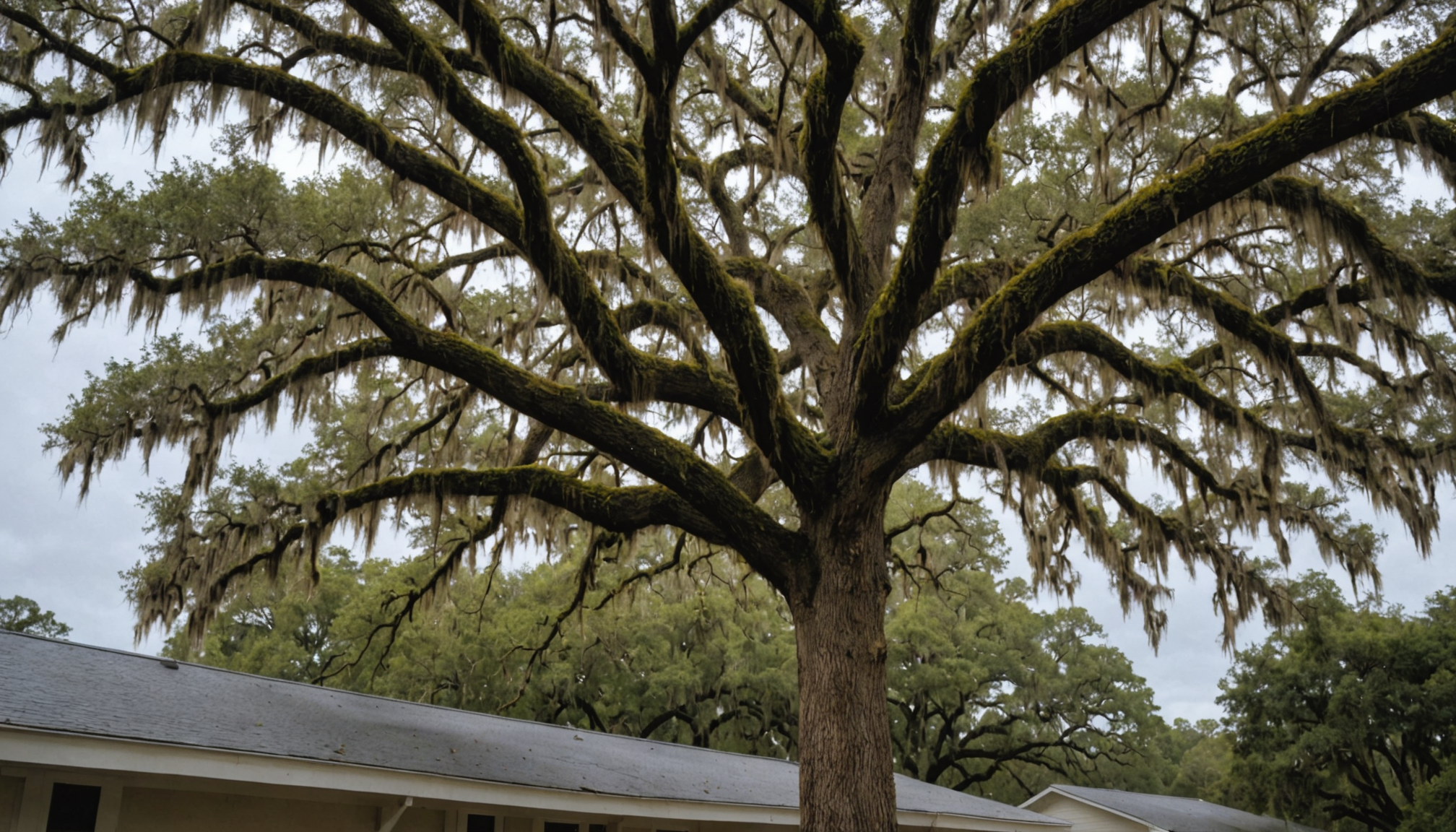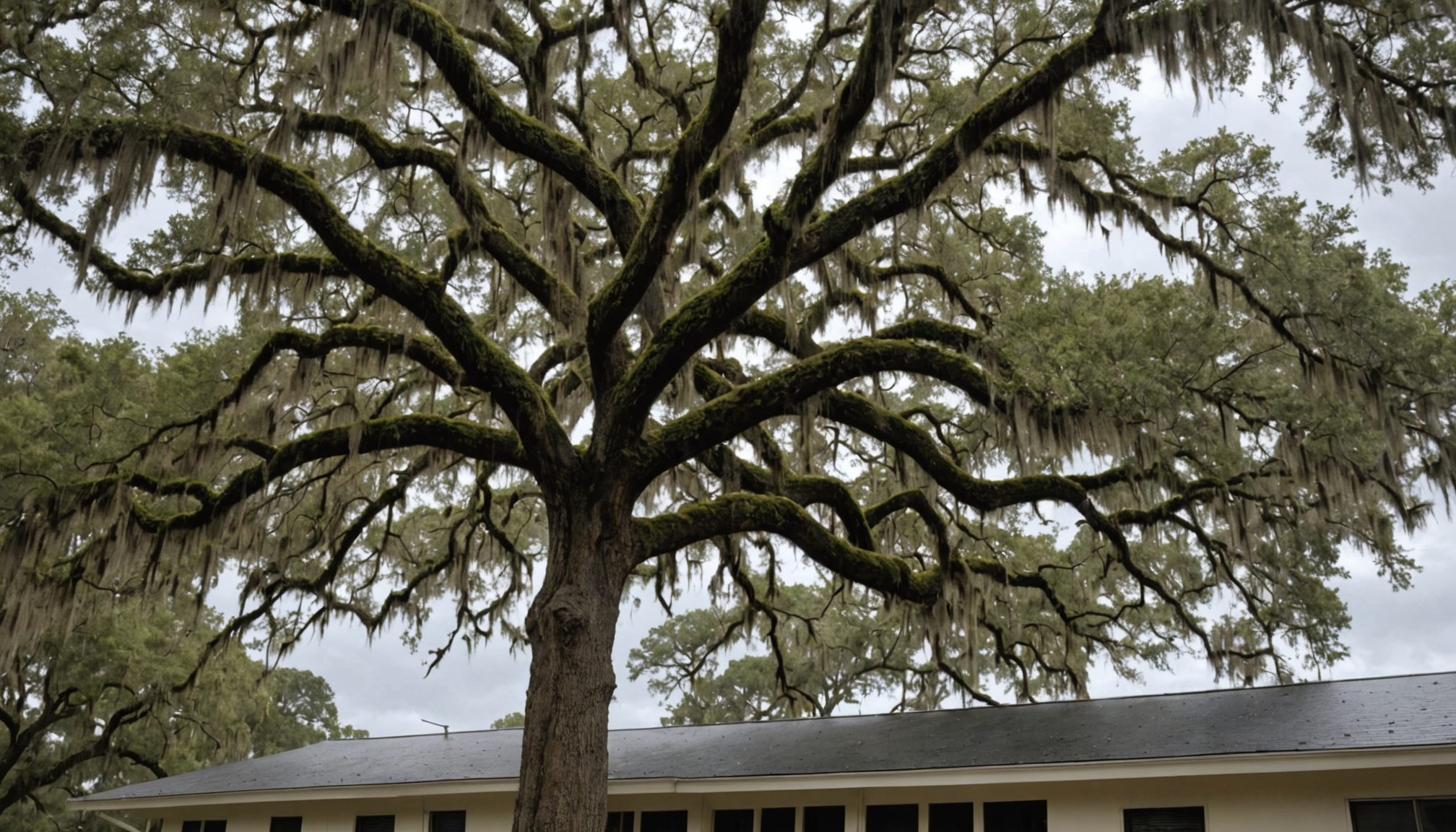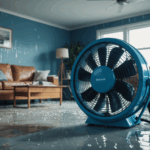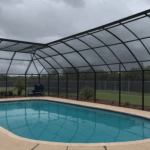Jacksonville’s dense oak tree canopy, while providing beautiful shade and character to the city, presents unique challenges for homeowners throughout the year. According to the City of Jacksonville’s Urban Forestry Department, live oaks comprise approximately 35% of the city’s tree canopy, making leaf management a year-round consideration rather than just a seasonal task.
Unlike northern regions where leaf fall occurs primarily in autumn, Jacksonville’s oak trees exhibit distinct patterns of leaf shedding. Live oaks typically drop their leaves gradually from late February through early April, with a secondary, lighter leaf drop occurring in fall. This continuous cycle means gutters require more frequent attention than in other parts of the country.
The Florida Urban Forest Council reports that a mature live oak can drop approximately 500-600 pounds of leaves annually. During peak shedding periods, particularly in early spring, homeowners in Jacksonville’s oak-dense neighborhoods may notice their gutters filling up every 2-3 weeks. Areas like San Marco, Riverside, and Avondale, known for their mature oak canopies, experience especially heavy leaf accumulation.
- Early Spring (February-April): Primary leaf drop season, requiring bi-weekly gutter checks
- Summer (May-August): Lighter but consistent leaf and debris accumulation
- Fall (September-November): Secondary leaf drop period, coinciding with storm season
- Winter (December-January): Minimal leaf fall but occasional acorn dropping
Environmental factors unique to Jacksonville, such as high humidity and frequent afternoon thunderstorms, can cause wet leaves to compact and decompose more quickly in gutters. Dr. Michael Andreu, Professor of Forest Systems at the University of Florida, notes that this decomposition process can accelerate gutter deterioration if left unaddressed, particularly in older homes with aging gutter systems.
The city’s proximity to the coast also influences leaf accumulation patterns, as salt-laden winds can stress trees and cause premature leaf drop in areas closer to the Atlantic. Neighborhoods within five miles of the coast often experience more erratic leaf-falling patterns, requiring homeowners to adjust their maintenance schedules accordingly.
Preventive gutter maintenance and cleaning techniques
Regular maintenance of gutters in Jacksonville requires a systematic approach that combines thorough cleaning techniques with preventive measures. Starting with a comprehensive inspection, homeowners should check their gutters at least every three months, with more frequent examinations during peak leaf-falling seasons.
The most effective cleaning method begins with removing large debris using a gutter scoop or specialized tools, working from the downspout end toward the middle to prevent clogging. For Jacksonville homes surrounded by oak trees, installing gutter guards or screens can significantly reduce debris accumulation while still allowing proper water flow.
Homeowners should pay special attention to downspout connections and ensure they’re properly secured and free from obstruction. A high-pressure water test after cleaning helps identify any remaining clogs or leaks. For two-story homes, extending downspouts at ground level helps direct water at least 6-10 feet away from the foundation, which is particularly important during Jacksonville’s intense summer storms.
Maintenance should also include checking and tightening gutter hangers, as the weight of accumulated leaves and debris can cause sagging. Applying a gutter sealant to aging seams and corners can prevent leaks and extend the system’s lifespan. For homes with significant oak tree coverage, consider installing downspout strainers to catch leaves before they enter and clog the underground drainage system.
Professional-grade cleaning solutions can help break down the tannins from oak leaves that often leave stubborn stains on gutters. However, avoid harsh chemicals that might damage the gutter material or harm nearby plants.
- Clean gutters in sections, using a sturdy ladder with stabilizers, and always maintain three points of contact for safety
- Install mesh guards specifically designed for oak leaves, which are typically smaller than other tree debris
- Use a garden hose with a gutter cleaning attachment to flush out remaining debris and check for proper drainage
- Document problem areas and create a maintenance calendar based on your property’s specific tree coverage
Storm readiness and gutter protection systems
Installing robust gutter protection systems becomes crucial for Jacksonville homeowners, especially during the intense storm seasons. A multi-layered approach to storm readiness helps prevent costly water damage and maintains the integrity of your home’s drainage system.
High-quality micro-mesh guards prove particularly effective for Jacksonville’s oak trees, as they prevent even small debris from entering while allowing proper water flow. These systems should be rated for heavy rainfall, capable of handling at least 8-10 inches of rain per hour, which is common during severe storms.
Beyond basic mesh screens, consider investing in seamless gutters with built-in leaf protection. These systems typically feature a curved or hooded design that uses surface tension to channel water into the gutter while deflecting leaves and debris. For homes in hurricane-prone areas of Jacksonville, reinforced gutter hangers installed every 24 inches provide extra stability during high winds.
Key protective measures include:
- Installing gutter wedges or foam inserts that allow water flow while blocking debris
- Adding downspout extensions with quick-release mechanisms for storm preparation
- Using professional-grade fasteners rated for wind speeds up to 110 mph
- Installing gutter end caps with rubber gaskets to prevent leaks during heavy rains
Smart technology has also entered the gutter protection market, with systems that monitor water flow and alert homeowners to potential clogs. While more expensive, these solutions can be particularly valuable during Jacksonville’s unpredictable storm seasons.
Remember to inspect protection systems monthly during storm season, ensuring they haven’t become loose or damaged. Check that all components are properly sealed and that no gaps have developed between the gutter and fascia board. For maximum effectiveness, combine physical barriers with regular maintenance checks, especially before predicted severe weather events.
Water diversion systems, such as rain chains and barrel collectors, can complement traditional gutter protection, providing backup options during periods of excessive rainfall. These additions help manage water flow and prevent foundation issues common to Jacksonville’s sandy soil conditions.
Common gutter problems during hurricane season
Heavy rainfall and intense winds during Jacksonville’s hurricane season create several challenging issues for gutter systems. Water overshooting gutters due to clogged channels ranks among the most frequent problems, often causing foundation damage and basement flooding. During storms, gutters filled with oak leaves and debris can become significantly heavier, leading to sagging or complete detachment from the fascia board.
Wind-driven rain frequently forces water up and behind gutters, particularly when debris has created dams that prevent proper drainage. This can result in rotting fascia boards and water infiltration into the home’s structure. In areas with mature trees, branches and falling limbs during storms can damage or completely dislodge sections of guttering, creating immediate repair needs.
Common issues observed during hurricane season include:
– Clogged downspouts causing water backup and overflow
– Loosened gutter brackets from wind stress
– Separated seams due to thermal expansion and debris weight
– Crushed or dented sections from falling branches
– Algae and mold growth in consistently damp areas
– Deteriorating fasteners and mounting hardware
The combination of Jacksonville’s humid climate and organic debris creates perfect conditions for rust development, especially in older metal gutters. This corrosion weakens the system’s integrity precisely when it needs to be strongest. Additionally, improperly pitched gutters can collect standing water, becoming breeding grounds for mosquitoes and accelerating deterioration.
During severe weather events, gutters often face unprecedented stress from wind uplift, particularly on homes with older installation methods. Modern gutter systems should include additional support brackets and heavy-duty fasteners rated for hurricane-force winds, ideally spaced every two feet rather than the standard three to four feet.
To minimize these issues, conduct thorough inspections before and after major storms. Check for:
– Loose or missing gutter spikes and brackets
– Signs of separation between gutters and fascia
– Proper downspout attachment and functionality
– Evidence of water damage on siding or foundation
– Debris accumulation around gutter guards or screens
Remember that addressing minor problems promptly can prevent catastrophic failures during severe weather. Regular maintenance and timely repairs are your best defense against the challenging conditions that Jacksonville’s hurricane season presents.
Professional cleaning services vs diy maintenance
- How much does professional gutter cleaning typically cost in Jacksonville?
- Professional gutter cleaning services in Jacksonville generally range from $150 to $350, depending on home size and tree coverage. The price typically includes debris removal, downspout cleaning, and a basic inspection of the gutter system.
- How often should I have my gutters professionally cleaned if I have oak trees?
- For homes with oak trees in Jacksonville, professional cleaning is recommended at least quarterly, with additional cleanings during peak leaf-drop seasons. Properties with heavy tree coverage may require service every 6-8 weeks during spring and fall.
- What are the risks of DIY gutter maintenance?
- The primary risks include ladder accidents, which account for over 164,000 emergency room visits annually in the US. Additionally, inexperienced homeowners might miss structural issues or damage gutters through improper cleaning techniques.
- Can I save money by maintaining my gutters myself instead of hiring professionals?
- While DIY maintenance can save money initially, professional services often prove more cost-effective in the long run. Professionals can identify potential problems early and have specialized equipment that ensures thorough cleaning and prevents damage to the gutter system.
- What should I look for when hiring a professional gutter cleaning service in Jacksonville?
- Look for companies with liability insurance, workers’ compensation coverage, and positive local reviews. Reliable services should provide written estimates, offer warranties on their work, and have experience dealing with Jacksonville’s specific oak tree and storm challenges.











